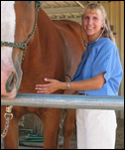
Dr. Kimberly Gryl DVM
Meet Dr. Kimberly A. Gryl DVM
Dr. Gryl joined Chaparral Animal Hospital in Cave Creek Arizona June 2004.
She is a graduate of the University of Illinois College of Veterinary Medicine, and completed a 1-year Internship in Equine Medicine & Surgery at Chaparral Animal Hospital.
Dr. Gryl is most interested in Reproduction, but enjoys all aspects of Equine veterinary practice.
Kim enjoys outdoor activities and is an avid hiker and camper.






















Hi Kim! I hope this message reaches you and finds you well! I wanted to ask you about the use of regumate to alleviate my mares heat cyles. I have a lovely four year old mare that I am training and she is wonderful except for her heat cyles (imagine that?? ha ha). I have never used it consistently to prevent a heat cycle so I wanted to ask you about it. We have had unseasonable warm weather but winter finally seems to be arriving so I don’t anticipate winter issues but come spring I will need to have a plan! Can you give me an idea of the cost and dosage frequency for maintaining a mare on regumate administered orally? She is about 16.1 hands and I can guestimate her weight at around 1100 pounds.
I hope this message reaches you and would love to be able to correspond with you by email.
Lisa Holley
Lisa:
Hi there Lisa!!! Great to hear from you!
Your question is a good one. So many people go through this, you are not alone. For the most part, your mare should not be cycling anymore this year. Especially with as many dark hours and cold weather you get up there. Make sure she is not under excessive “daylight” hours — this includes artificial lighting in the barn + daytime sun, as this will prompt her to begin cycling earlier next year (like probably Jan or early Feb). As far as starting Regumate, it should begin when she is out of heat. The average dose for a full-size mare is 10 cc once daily. This can be given orally via syringe or top-dressed on feed — as long as you know she’s eating it. You can check with your local vet for certain on start date, but you should probably begin in January to keep her from cycling back in. Regumate is a very reliable product for keeping mares out of heat.
I hope this helps, and keep in touch!! Email soon 🙂
Kim
Hi Kim, I have a question about my daughter’s 12 year old horse Pistol…
Pistol recently had surgery for what we thought was a hernia, but it turned out that when he was castrated, the person who did it, never removed all they were supposed to, and left the tubing in him. Fluid was building up, causing pain and inflammation, etc… Pistol had surgery to remove it, and he is home with us now. We have to give him medicine, and push up where the incision was to release the fluid in there from building up. Today we noticed that his sheath is extremely swollen. We have to wait to hear back from the surgeon now. Do you know why this may be happening??
Hi
I am looking for an article on how to properly clean a gelding’s sheath; especially removing “beans”.
Can you direct me to such an article or explain how to go about this task? I’m also wondering how often this should be done, and how you can tell when it needs to be done more frequently?
Thank you,
Jennifer A.